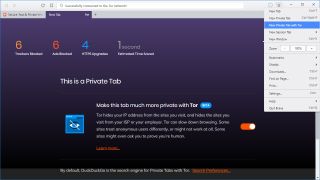Brave is testing Tor-powered tabs to bolster private browsing
Native Tor support is only for the Brave (browser).

Brave Software is looking to take private browsing to a new level by integrating onion routing from the Tor Project into its browser. In the latest release, the option is available when selecting a new private tab.
What is Brave, and what is the Tor Project? Let's start with the former. Brave is an open source browser that is based on the Chromium project. One of the company's founders, Brendan Eich, is the creator of the JavaScript programming language and co-founded Mozilla. He also served as Mozilla's CEO for a brief period, before leaving the company in the middle of a controversy stemming from his support of an anti-gay ballot (Proposition 8) in California.
At the beginning of 2016, Eich announced the Brave browser, pitching it as a safer, more private way to surf the web by replacing or outright blocking ads, and dodging website trackers. It's now added Tor as an option for users who want an even more private browsing experience.
As for Tor, it is a network of volunteer-operated servers located all over the world. The software essentially allows you to browse the web anonymously by connecting you through a series of virtual tunnels instead of making a direct connection.
Users can download Tor and browse the web with it, or access the Tor network through an extension. However, Brave is the first browser to integrate Tor as a native feature.
"The Brave browser already automatically blocks ads, trackers, cryptocurrency mining scripts, and other threats in order to protect users’ privacy and security, and Brave’s regular private tabs do not save a user’s browsing history or cookies. Private Tabs with Tor improve user privacy in several ways. It makes it more difficult for anyone in the path of the user’s Internet connection (ISPs, employers, or guest wi-fi providers such as coffee shops or hotels) to track which websites a user visits. Also, web destinations can no longer easily identify or track a user arriving via Brave’s Private Tabs with Tor by means of their IP address," Brave explains.
The biggest downside to using Tor, either as a standalone browser or through Brave, is speed. I fired up a private tab with Tor in Brave and headed over to SpeedTest, which detected I was in Ghana. It showed by download speed at 16.17Mbps, upload speed at 2.12Mbps, and ping at 287ms. In a separate, non-Tor tab, SpeedTest (running on a closer server) showed a download speed of 99.31Mbps, upload speed of 11.29Mbps, and a 16ms ping.
The biggest gaming news, reviews and hardware deals
Keep up to date with the most important stories and the best deals, as picked by the PC Gamer team.
So, you can expect a significant hit to browsing performance when using Tor, there's just no getting around that. Still, if you want the added privacy, it's now available in Brave.
It might not be exclusive to Brave for very long, though (in terms of being a native feature). As CNET points out, Mozilla partnered with Tor in 2016 through a project called Tor Uplift, and is working to integrate Tor into Firefox at some point as well.
Follow this link if you want to kick Brave's tires.
Paul has been playing PC games and raking his knuckles on computer hardware since the Commodore 64. He does not have any tattoos, but thinks it would be cool to get one that reads LOAD"*",8,1. In his off time, he rides motorcycles and wrestles alligators (only one of those is true).
Most Popular






